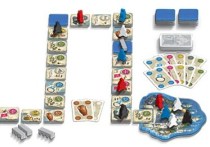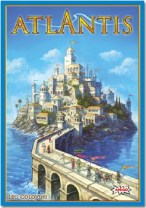Review: Atlantis
Posted by James (admin) on November 22nd, 2009
 Many people have compared Atlantis to Cartagena but I shall review Atlantis from fresh as not everyone has played Cartagena (and will add a few notes about Cartagena at the end).
Many people have compared Atlantis to Cartagena but I shall review Atlantis from fresh as not everyone has played Cartagena (and will add a few notes about Cartagena at the end).
In Atlantis, 52 stacks of tiles are laid out in a trail leading from Atlantis to the mainland with one water tile in the middle. The tiles are either in stacks of two tiles or single tiles. Each tile shows one of 6 different symbols and each has a number on them from 1 to 7. Players have three meeple (which they will move from Atlantis to the mainland) and a hand of cards which each show one of the different symbols. The goal: To collect as many points as possible.
Each turn, a player plays a card and moves one of their meeple to the next tile along that shows the matching symbol. If that tile is already occupied by anyone, the player must play another card and move again. When a meeple ends its move, the player takes the first unoccupied tile behind it. Each tile the player has at the end of the game is worth points equal to the number on it.
What adds a lot of gameplay is that, when a tile’s removal causes a gap, a water tile is placed to fill the gap. To cross a water gap, a player must pay a number of points equal to the lowest of the two numbers on the tiles either side of the water, i.e. water bordered by tiles numbered 7 and 3 would cost 3 points to cross. Players use tiles they have collected to pay for this, plus they can use cards from their hand which are worth 1 each. Of course, the cost of crossing water can change as more tiles get removed and therein lies one of the tactics in the game. Also, each player has one bridge which they can place (permanently) to allow them (and any other player from then on) to cross a gap for free.
After moving a meeple, the player takes one new card, plus one extra card for each of their meeple that has reached the mainland. (Note that at the start of their turn, players can buy extra cards by using the points they have already collected – each 2 points gives the player a card).
When any player has all three of their meeple on the mainland, the game ends and all other players must move their remaining meeple to the mainland and pay for any gaps they cross as they do so. Players add up the points they have left and the one with the most points wins.
 Overall, Atlantis is a light, tactical game but offers lots of great choices. It sounds incredibly simple and it is too but that doesn’t stop it from offering some tricky decisions and short-term planning. Your plans may have to change as the tiles change as other players move, but responding to these changes is part of the fun. You are faced with decisions on pay-offs like: Do you rush one meeple to the mainland to get more cards each turn but then probably encounter more gap crossings with your other meeple who are further behind? Do you make a long moves which only gets you one tile, or take short moves to grab multiple tiles at the risk of more gaps appearing ahead of you? Do you wait for the right card, or buy extra cards? Is moving to a good position which only gains you a 1-point tile a good move? Lots of interesting but simple decisions.
Overall, Atlantis is a light, tactical game but offers lots of great choices. It sounds incredibly simple and it is too but that doesn’t stop it from offering some tricky decisions and short-term planning. Your plans may have to change as the tiles change as other players move, but responding to these changes is part of the fun. You are faced with decisions on pay-offs like: Do you rush one meeple to the mainland to get more cards each turn but then probably encounter more gap crossings with your other meeple who are further behind? Do you make a long moves which only gets you one tile, or take short moves to grab multiple tiles at the risk of more gaps appearing ahead of you? Do you wait for the right card, or buy extra cards? Is moving to a good position which only gains you a 1-point tile a good move? Lots of interesting but simple decisions.
Finding ways to make your crossings cheaper, and finding ways to make other people’s crossings more expensive, is a lot of fun too. You usually have a fair amount of choice but not too many that it’s bewildering.
Atlantis looked simple, tactical and fun so I bought it at Spiel without even knowing the rules or playing it, and I’m very glad that I did. Pleasingly, it delivers a great, light game which gamers can enjoy but would also be a good gateway game for non-gamers to try too – it’s about the same level as Carcassonne. We found it played well with two-players and I’m sure it will be equally as fun with more players (which will add more action and uncertainty).
For those who have played Cartagena, the idea of playing a card to move a meeple to the next matching symbol is not new. But it’s only that core mechanic that is the same as Atlantis adds a lot more around it. I like Cartagena but it’s quite simple, and the tile collection, spending choices and water gaps in Atlantis add the extra decisions and depth to make it a different game which I find more interesting. If you like Cartagena, then I think you will like Atlantis.
James.
[Played twice with 2 players]

